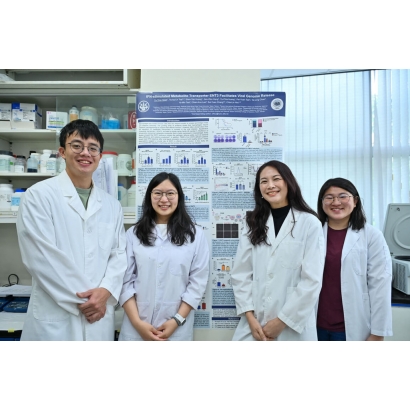As we enter the epidemic season for Enteroviruses, type 71 has shown to most likely result in severe cases. A cross-institutional team from National Yang-Ming University has discovered that the transport protein that assists in delivering nutrients to cells, inadvertently opens a channel, becoming a gateway for the invasion of enterovirus type 71 and others.
As of today, Yang Ming University’s Microbiology and Immunology Research Institute, led by Associate Professor Hsu Chialin, along with a team composed of Professor Zhang Shuyuan from the Medical Laboratory Science and Biotechnology Department of National Taiwan University, unveiled their latest findings on the invasion mechanism of enterovirus. The research results have since been published in an international journal.
The research team pointed out that the third-type equilibrative nucleoside transporter (ENT3) is responsible for transporting nucleosides through the cell membrane, supporting various physiological reactions within the cell. This transport protein is highly expressed in macrophages of the immune system and also affects the survival of T lymphocytes. When immune cells are at the frontline combating viruses, this protein can be seen as a “supplier”.
Nevertheless, the research team unexpectedly discovered that various viruses, including enterovirus type 71 and SARS-CoV-2, can also exploit this transport protein-supported supply route to invade the cell cytoplasm. According to the latest research from Yang Ming University’s Microbiology and Immunology Department, removing or reducing the expression of the third-type nucleoside metabolism transporter in cells and mice can effectively inhibit viral replication.
Lead researcher Hsu Chialin stated, “Cells have to open the city gates to receive supplies, viruses would then also use this route to secretly gain access into the cell.” Originally thought to help immune cells provide the necessary metabolic supply during combat, it turns out that viruses also use this channel for invasion. If the gateway is closed after the virus enters the cell, it goes down a rabbit hole, unable to further replicate or reinfect.
The research team pointed out that when pathogens invade, the immune system triggers the production of interferons to fight the virus. The expression of the third-type nucleoside metabolism transporter is also regulated by interferons. When interferons are released and increase the expression of the transporter protein, both enterovirus type 71 and SARS-CoV-2 utilize this antiviral mechanism to invade the host, perfectly demonstrating the offense and defense relationship between viruses and immune cells.
Hsu Chialin described this process as a “war between spies”. When immune cells are infected by viruses, they will adjust their metabolism to resist the attack. These metabolic adjustments require the assistance of transport proteins. This research finding has led scientists to discover that metabolic transport proteins also participate in the interaction between viruses and hosts. Therefore, if utilized, these transport proteins may serve as a new direction for drug development.
